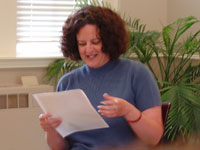- Campuses :
- Twin Cities
- Crookston
- Duluth
- Morris
- Rochester
- Other Locations

center for writing
mwp.umn.edu
Shelly Bertrand
© 2004
 The List
The List
Three months into my studies in China, having exhausted the officially sanctioned recreational activities of the mid-80s, I realized I would be forced to make my own. Thatis when my friends and I devised our own form of recreation that also enabled us to improve our language skills while exploring China. A fearless professor provided my friend with a list of approximately 80 controversial, semi-banned and banned books, and our search began. I'd always loved scavenger hunts and Easter egg hunts, so I knew this challenge was for me. From that day on, every time we ventured off campus, taking the #8 bus downtown or a train to another city, we were armed with our list. We no longer noticed the fingers pointing in our direction or the shouts of "foreigner," "lao wai," "American," "big nose," or "foreign devil." We were on a mission. Our goal was to find and purchase every book on that list before the end of the year. As books sold for only 50 cents it was a cheap source of recreation. And most importantly, it killed a lot of time. Time was the one thing we had plenty of in China.
It was especially rewarding to find a book in the state-run Wenhua Shudian in the smallest of towns, far from Beijing, where the news of the authors' fall from grace hadn't yet reached and the books still remained on the shelves. It was reassuring to know that the state could not control everything. The bookstores were small and dusty. The floors scuffed and the lights dim. They seemed to be designed to discourage people from lingering. Most of the books were behind the counters, and the clerks sat on their wooden stools guarding the merchandise they themselves had no desire to read, or to sell. On occasion, I wondered if in fact the clerks were illiterate; when I asked for a book directly behind their heads, andthey responded, "No, we don't have it." I tried pointing and would be told, "Come back tomorrow," as if they had sold their quota for the day, their jobs safe. They had no intention of interrupting their conversation or getting off their stools to release the book from its prison and make out a receipt. Sometimes, I managed to tell a joke or a story to cajole the clerk into reaching for the book. Sometimes, it was almost like they knew that they shouldn't be selling that book.
One of my great finds was in Lanzhou. As I walked down the street, I noticed a man spreading out his tarp and arranging books on it. A huge crowd gathered and, as it was illegal for him to be there, I anticipated a great find. I pushed my way to the front of the crowd and studied the book titles one by one. The bookseller eyed me conspiratorially and lifted the edge of the tarp to show me the books hidden there. I saw the slim, green volume I had recently read about in the People's Daily, "Good Morning, Friend" by Zhang Xianliang. Both Zhang Xianliang and the book had recently been criticized; the book had been recalled, all other printings halted. I gleefully bought copies for myself and my comrades much to the amusement of the bookseller and the customers. They grinned at me in tacit acknowledgement of the "crime" I was committing. Passers-by stopped to inquire what the "laowai" was buying, as the customers quietly responded, "Zhang Xianliang de shu."
The list I so laboriously copied from the original still sits in my journal. The boxes of books I acquired remain in my attic. Not one have I ever read, but somehow I just can't bring myself to part with them.



